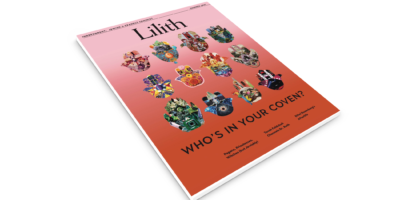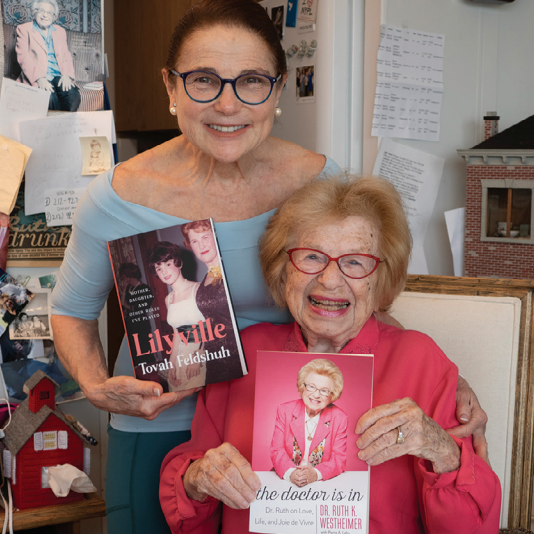
Tovah Feldshuh is a Mensch on a Mission
TOVAH FELDSHUH uses the word mensch a lot. I had always associated the term with men—it does mean “man” in German—but it’s a word that has entered the American vernacular. It even appears as the Hanukkah “Mensch on a Bench” toy, a Jewish response to the goyish “Elf on a Shelf.” The Mensch is a stuffed bearded man who sports a white and blue tallit. Apparently it’s his job to sit and smile at the menorah.
Feldshuh doesn’t sit much, and her use of the term is accordingly more active. “I don’t know enough Hebrew or enough Yiddish to qualify gender here, but to me, a mensch is a fully formed human being who is awakened. Like the Dalai Lama is a mensch.”
“What about Joe Biden?”
“Mensch. He has empathy!”
“RBG?”
“Totally.”
I first experienced Feldshuh’s unique brand of menschiness in a bright rehearsal studio in midtown in January 2019, when we were both cast in “The Soap Myth” by Jeff Cohen, starring Ed Asner—another man she names a mensch—as a cantankerous Holocaust survivor. Feldshuh played the conservative museum scholar and charismatic Holocaust denier to my susceptible Jewish journalist trying to distinguish between history and mythology.
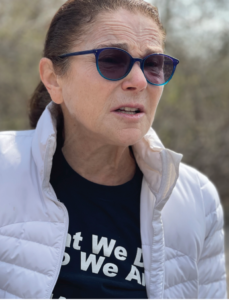
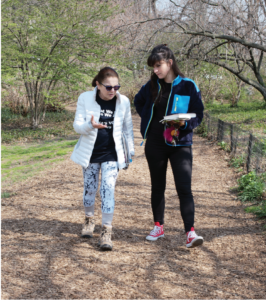
Feldshuh is a sprite at 68, with two Emmy awards and four Tony nominations, including one for her portrayal of Golda Meir in “Golda’s Balcony,” the longest running one-person show in Broadway history; it opened at the Helen Hayes Theater on October 15, 2003 and ran for 14 previews and 493 performances. She’s known also for her television work, particularly her roles as Deanna Monroe on “The Walking Dead” and Helena Slomova in “Holocaust.” I thought she looked like my mom.
I remember peering over her shoulder at her script, which was re-typed with her lines reformatted. “I architecturally arrange the lines according to thought patterns,” she later explained to me. Backstage, she crooned lullabies to her newest grandchild over the phone and typed up bits and pieces of a memoir with her hair in rollers.
Since life so often imitates art, I recently followed Feldshuh around for two hours in Central Park in the windy days following the second pandemic Pesach, a white binder in one hand and in the other a hardcopy of that memoir, Lilyville, published this past April by Hachette Books. Lilith’s Joan Roth joined us to photograph. (I tower over these two tiny Jewish icons in height only.)
Feldshuh is—by both gendered and un-gendered definitions— a woman known as a mensch. While younger viewers tend to recognize her as Rebecca Bunch’s overbearing but endearing mother in Crazy Ex-Girlfriend, her career of playing iconic women in Judaism began decades ago as a defiant Jewish daughter. She played the eponymous Yentl in the original 1974 Broadway production of the adaptation of Isaac Bashevis Singer’s story of a young woman who dresses as a man to study Talmud at yeshiva. All this was before Barbra Streisand created the film version.
Feldshuh describes Yentl as “a young woman who is driven to sacrifice her feminine identity in order to follow her passion to study Torah.” The story itself is a kind of prophetic and loving warning: in a segregated Jewish society, women’s spirituality is equal in name only as long as the portals to holiness and the relationships to G-d are maintained by and for men. I honor Feldshuh’s note in Lilyville by using her spelling: “this non-Kosher-keeping first-time author has chosen to refer to the Being Upstairs as G-d.”
Singer was, obviously, no stranger to these internal dilemmas. Whatever it was that made Yentl cut her hair and devote herself to texts, similarly drew Feldshuh to the play, even though she had already committed to playing Amy in the revival of the musical “Where’s Charley.” Then the audition for “Yentl” arrived. She fell in love with the “motherless boy/girl” who navigated the complications of self-actualization as a product of identity and expectation.
The gender segregation that Yentl faces wasn’t unfamiliar to Feldshuh. The character confronts the uncomfortable illusion of access as the lone woman praying inside a fraternity of power; Yentl was not fooled by the sly idol switch of misdirection when women are praised only as the bearers of children, an expense that traditionally came at the cost of their internal and intellectual lives. In order to have it all, she became someone who could. Feldshuh had her own iteration of this question and a similarly blunt answer: how do a Jewish mother who believes you can’t have it all and a Jewish daughter who lives like she can get along? “They don’t.” Better to be a mensch.
“Why did I write a book? Because I was asked,” Feldshuh quips. She then explains: “The book is written not as a celebrity biography.” In the “Program Note” to Lilyville, which she intentionally wrote in a theatrical three-act structure, she invites the reader into the “theater of memories,” in particular her memories of her mother, Lillian Kaplan Feldshuh, a reticent, fault-finding woman who bloomed in widowhood. Looking back, Feldshuh wondered: “Why don’t I see my life through the lens of my mother? And my mother’s life through my lens? … Everybody is a child.
They may not be a parent, but everybody is a child.” In Lilyville, Feldshuh touches on everything from knowing “how to make an entrance”—a.k.a. being born—to changing her name from Terri Sue to Tovah, to the dark empty days when she moved to Hollywood (she’s back in New York City for a reason). Her attention to detail reflects a profound sensitivity: in a particularly touching moment, at 11 years old, she recounts the day she started her period. Her mother salutes her—“This is wonderful. You are developing just as you should”—and openly refuses to engage in the Eastern European tradition of welcoming her daughter to womanhood with a slap. Her father, Sidney Feldshuh, came home that night with a bouquet of roses and a loud exclamation: “Congratulations on becoming a woman! This is a moment to remember!” A quiet courtesy from her mother, Kotex mysteriously appeared later, next to the flowers.
Obviously Feldshuh isn’t embarrassed. Of anything. As joggers ran by, she described the morning of her father’s death: Sidney died on May 11, 1996. Her mother arrived to the hospital in the morning in the diamond rings and choker pearls he had given her. In what Feldshuh describes as a moment of profound elegance, her mother kissed the genital area over the sheets, and said: “Thank you for my life. Thank you for my children.” Five minutes into our walk, she stated bluntly: “My mother never told me she loved me. Obviously I asked.”
“What did she say when you asked?”
“‘Of course I love you. Who takes you to your voice lessons and to Hebrew school?’”
Feldshuh chronicled those quieter years in her book: “I had to create a whole artificial universe to keep me company because of the silence from the Lily bird.” No one was more surprised than Feldshuh when her mother burst into a “dazzling Technicolor” after her father’s death—“so when I thought no one would be by my side, there was my mother” who finally stopped fixing her. “I was a person of words and she was a person of deeds, and we learned from each other.”
Feldshuh’s own character emerges when she talks about her transition to motherhood and how quickly it reflects back on her work onstage, and the other way around. Before Lily opened up to her daughter, Feldshuh cites a different mother’s lesson. “My greatest mother before I sorted things out with mine was Uta Hagen,” the highly influential acting instructor who originated the role of Martha in Edward Albee’s “Who’s Afraid of Virginia Woolf” in 1962, and Feldshuh’s teacher.
“[Uta] would see terrible work, cockeyed work, and she’d say ‘That’s interesting. Why don’t we try it this way?’” Feldshuh laughs. “That’s how I learned to coach soccer. ‘Coach, coach! I made a goal. I made a goal with my elbow!’ And I’d say ‘That’s interesting! Wait a minute! I have an idea! Why don’t we try with your foot?’”
Every time Feldshuh Mentions her mother as we walk through the park, she channels her. She knows Lily’s words by heart. She’s off-book, but it’s not a performance, it’s a manifestation. When Feldshuh started dating an objectively lovely Jewish entertainment lawyer, a man 14 years her senior, with air conditioning in New York City in August, Lily pulled her into the utility room and said “You’re not going to marry that old stick-in-the mud, are you? At best, you’ll wind up as a nurse with a purse, and at worst, you’ll be a young widow.”
In Lilyville, Feldshuh describes how she landed the role of a sagacious Jewish grandmother (also coincidentally named Lillian) in the acclaimed 1999 film A Walk on the Moon that starred Diane Lane and Viggo Mortensen. Feldshuh phoned Lily after the audition to tell her that Feldshuh volunteered to read out loud the “backstory [she] had written for the character.” The surprised artistic team agreed, and Feldshuh proceeded to read Lily’s diaries. Lily interrupted to call her daughter a goniff (Yiddish for “thief”), but Feldshuh plundered on: “Then I took off my sweater and flipped the fat under my left arm, the way I used to play with yours.”It turned out Lily didn’t mind being looted when Feldshuh booked it: “Then you should bring me to auditions more often.”
“I’m going in, Joan, I’m going in” she calls out and rushes into the tulips, turning back with book in hand and a broad smile.
Without theater in Covid-19 times, Feldshuh has remained busy. “What is the greatest pastime for an artist that wants to keep going? Writing.” And what has it been like to be cooped up with her husband? “I am married to a paid paranoid. A great lawyer sees 50 aspects of every problem… and he’s been practicing law for over 50 years. We met Covid-19 slightly differently—I got Covid-19, and he didn’t.” Together, though, they’ve run 52 Zoom Shabbats. “Margaret Mead says you marry one man—in my case, one man, I happen to be a practicing heterosexual— you can marry one man several different ways or you can marry several men the same way.”
As the pandemic eases, she has her eye on the horizon, a new role in Mark St. Germain’s “Becoming Dr. Ruth” at North Coast Rep—ever hopeful, she quips, “if the fates are with me, I’ll be playing two Ruths.” Before the pandemic, she played Ruth Bader Ginsberg in “Sisters in Law” at the Wallis Annenberg Center for the Performing Artsin Los Angeles. She still has RBG’s spirit on her shoulder when the conversation turns to feminism: “As RBG said, I had to teach nine justices—and I say nine penises—that gender inequality existed. What they saw as a pedestal, I knew was a cage.”
With Dr. Ruth Westheimer, whom she’s shadowing these days, Feldshuh’s interested in her smile (or lack thereof). “The smile is not an easy give—that’s the insight of an artist with a brain. It costs something… that’s the key to her bravery.” Feldshuh cares for and carries these women, whether fictional or not, with her. There’s a kind of spirituality to the way she absorbs the characters she plays by accessing their humanity and harnessing their wisdom. How does Feldshuh find her way into her characters? “You look for coincidence. Where is the cellular coincidence?”
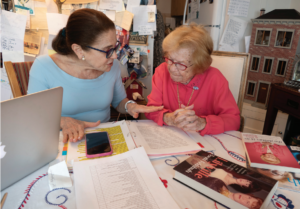
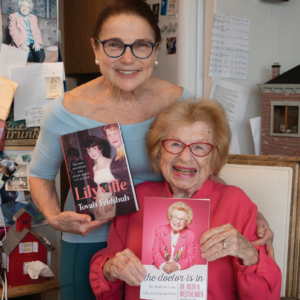
I asked her what all these Jewish women she has played have in common? Besides her? Golda Meir, Dolly Levi, Noami Bunch, Yentl, the Ruths… “There is a word in German that Ruth [Westheimer] uses… stehaufmännchen… check the spelling! It’s those clown dolls—Joe Palooka dolls—we used to have in the ‘50s. When you push them down, they pop right back up. That’s one thing they have—they are able to withstand the ‘no’.” There it is again: the mensch. I did check the spelling. And the definition. Stehaufmännchen is someone who always bounces back.
Even Feldshuh’s outfit reflects another woman she carries within her; she sports a rehearsal t-shirt from “Irena’s Vow,” a play in which she starred as the Polish nurse Irena Gut who saved Jews in World War II. “There are no coincidences! I wore this on purpose,” she says, pointing to the white lettering across her chest and reading aloud: “What we do is who we are.”
“I don’t have Hashem on my shoulder” she answers, when I ask her about faith. “I am not an intellectual deist… I would equate my faith more to what I call G-d-spark, that is the g-dliness inside every mensch, that is inside every formed and informed human being.”
She’s unafraid to marry the divine to the quotidian in what she calls the third act of her life. “I believe in our rituals— because we have such a fabulous, practical religion. What other religion asks you gamble at Hanukkah, asks you to dress as the other sex for Purim, asks you to get drunk at Passover, and asks you to screw your brains out on Friday night? It’s fabulous. And a tenet for divorce is if the husband doesn’t honor the wife’s bed! Every Jewish woman is entitled to an orgasm, and don’t you forget it.”
As Joan Roth and I laugh, and Feldshuh insists: “I don’t merely love Judaism, I treasure it. It is the practical guide to the full life movement. The one thing about observance—it keeps you so busy that you don’t have time not to be a Jew.” Feldshuh, too, does not have time to not be Feldshuh. She’s already late.
We’re rushing along the bridle path, back to her apartment because she has to take a Lilyville interview that’s entirely in French. She turns to me, “The existential abyss comes closer and closer. Thus I fill my life with a lot of activities!” We sit down together on the bench by Central Park West for a quick picture, and Roth has Feldshuh put her hand over mine. Her nails are perfectly painted, and she’s so little that she’s had to move her wedding band to her third finger. My nails are bitten, and I haven’t worn a ring in years.
“I do believe in our obligation to live to our highest level of decency,” she says before she disappears into her building. And with that, the mensch is off the bench.
Liba Vaynberg is a writer and actor based in NYC

